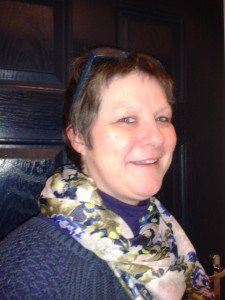 Our hospice provides a number of different services from in-patient care to clinics for people who need just a little extra help. One of the clinics we run offers complementary therapies such as reflexology and aromatherapy to patients who have been diagnosed with progressive illnesses such as cancer.
Our hospice provides a number of different services from in-patient care to clinics for people who need just a little extra help. One of the clinics we run offers complementary therapies such as reflexology and aromatherapy to patients who have been diagnosed with progressive illnesses such as cancer.
Gilly Wood, aged 46 from Welshpool, is one of the many patients who have been referred to us for complementary therapies. These therapies help alleviate distressing symptoms patients experience as a result of their disease.
Like many of those receiving our care, Gilly was having trouble sleeping and needed some support to help her get back on her feet.
“Since I was first diagnosed the support has been fantastic,” says Gilly. “The nurses in the oncology department have been brilliant and I always felt they were there for me if I needed their help. When I started developing pains in my arm and having real trouble sleeping I went to see them. One of the nurses mentioned she might refer me to the hospice for a little bit of ‘TLC’. At the time I thought it was a bit ridiculous as it was only a bit of pain, I was hoping for something a bit more practical.”
Gilly reveals how she felt about coming to the hospice for the very first time and how much of an impact it has had on her life.
“Throughout my illness I have been very upbeat about things, I have continued to work and hadn’t really given the hospice or death much thought. But it is frightening how quickly you can go downhill and need help. I hadn’t been sleeping and there were a few other things happening in my life – on reflection I didn’t realise how low I was.
“When I was sat in the reception area of the hospice in Shrewsbury I had an over whelming feeling of ‘What am I doing here?’ I was a bit of wreck by the time I came to see Sue, my complementary therapist, but within five minutes I started to feel better. I think the reality of the situation hit me and I realised that there was someone there to help and more importantly to talk to. I don’t think I had faced up to cancer.”
Complementary therapies play an important role in the care we provide at our three sites and out in the community. But Gill admits that, at first, she was more than a little sceptical about complementary therapy and how it was going to help her. Her opinion soon changed.
“Before going to see Sue I was bit cynical about complementary therapies. I thought they were lovely rather than useful and I’d rather have something useful, but I was wrong. The therapies are relaxing and helped with my pain and helped me to sleep but it also gives you the opportunity to open up, one way or another Sue gets you to talk about everything.
“From our first meeting Sue has helped me get back on my feet again as I was at a real low point. The advice and support she has given me has helped me with my family getting them to talk about things. There has been a big change, more than I had been expecting, which has been brilliant.
“Having visited the hospice I realise that is not somewhere you go to die but much more. Once Sue had worked her magic I was back to my old self again. I didn’t realise how much pain I was in or how much I needed rescuing but my sessions with Sue have been invaluable.”













